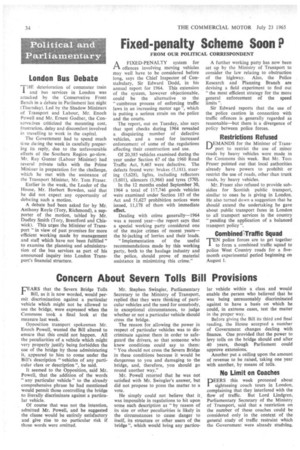Fixed-penalty Scheme Soon P
Page 36

If you've noticed an error in this article please click here to report it so we can fix it.
FROM OUR POLITICAL CORRESPONDENT
PiFIXED-PENALTY system for offences involving moving vehicles may well have to be considered before long, says the Chief Inspector of Constabulary, Sir Edward Dodd, in his annual report for 1964. This extension of the system, however objectionable, could be the alternative to the " cumbrous process of enforcing traffic laws in an increasing motor age ", which is putting a serious strain on the police and the courts.
The report, out on Tuesday, also says that spot checks during 1964 revealed a, disquieting number of defective vehicles, and a need for increased enforcement of some of the regulations affecting their construction and use.
Of 20,385 vehicles examined during the year under Section 67 of the 1960 Road Traffic Act, 9,465 were defective. The defects found were: brakes (5,181), steering (3,628), lights, including reflectors (3,601), silencers (1,966) and tyres (570).
In the 12 months ended September 30, 1964 a total of 117,746 goods vehicles were examined under Section 183 of the Act and 51,627 prohibition notices were issued, 11,178 of them with immediate effect.
Dealing with crime generally-1964 was a record year—the report says that a special working party considered one of the major crimes of recent years— the hi-jacking of lorries and their loads.
"Implementation of the useful recommendations made by this working party, both to the haulage industry and the police, should prove of material assistance in minimizing this crime." A further working party has now been set up by the Ministry of Transport to consider the law relating to obstruction of the highway. Also, the Police Research and Planning Branch are devising a field experiment to find out "the most efficient strategy for the more general enforcement of the speed limits ".
Sir Edward reports that the use of the police caution in connection with traffic offences is generally regarded as reasonable—but there is a divergence of policy between police forces.




























































































































